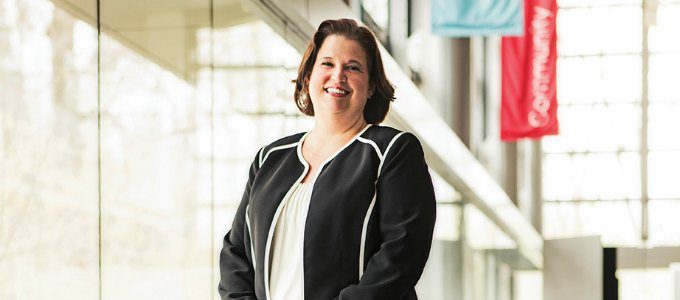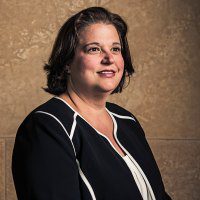
The Vanguard Group’s chief learning officer handles industry changes, embraces globalization and constantly looks to benefit everyone through her work.
by Kate Everson
July 17, 2014
Sherryann Plesse’s grandmother Sally had a motto: “When you stop learning, you’re dead.” She also had a sixth-grade education and learned to speak English as a second language.
“Sally drilled into me from a very young age that you have to be a lifelong learner,” said Plesse, chief learning officer for The Vanguard Group, an investment management company. “I really believe leaders have to be the most voracious consumers of learning.”
But Plesse didn’t start out in learning and development. The New York native got her bachelor’s degree in political science from the State University of New York at Stony Brook and her law degree from Villanova Law School, but never wanted to join a traditional law firm.
“So many times the adversarial environment of the law can result in someone being a winner and someone being a loser,” she said. “I’ve just never bought into that philosophy.”
Instead, the win-win environment of an investment management institution appealed to Plesse, and Vanguard’s mutual ownership structure offered a place where the clients benefit from the firm’s success, as do more than 14,000 employees in 16 countries.
Law Leads to Learning
Many learning leaders’ résumés are filled with experiences in workforce planning and instigating learning programs, but Plesse became CLO via a mélange of positions at Vanguard that started in September 1997.
Fresh out of law school, Plesse got a job answering the phones in Vanguard’s retail division as she received her securities license and waited to hear if she had passed the bar.
Four months into her job, she caught the attention of John Haines, one of the officers in her department who had heard the legal department was looking for someone to help with a short-term project.
Haines recommended Plesse for the position after learning she had her law degree, something that set her apart from her peers who mostly aspired toward, or were in the process of going to, law school. One interview with Plesse later, the legal department had a new intern.
Plesse said that was a critical moment in her career as a lawyer, and it also foreshadowed her work as a CLO by teaching Haines a new management mindset that would follow him to his current position as a principal at Vanguard. Recommending Plesse “was a pivotal time in my career, too,” he said. “It was reinforcement for me to not let a short-term issue get in the way of great long-term decisions. Don’t always focus on the short-term that you lose sight of the bigger picture and broader agenda.”
That bigger picture included Plesse joining Vanguard’s legal department in 1998 as an intern and months later becoming a compliance officer working with the firm’s largest 401(k) clients and on its own employee retirement plan. Her job allowed her to counsel clients at their point of need, an experience that she said echoes what she does today as a learning leader running programs in a highly regulated and volatile industry.
The job also enforced the importance of experiential learning and foundational skills. “Law school teaches you the theory and the basics, but it doesn’t teach you how to consult with clients,” she said. “It doesn’t teach you to advocate. It doesn’t teach you really the critical thinking you need.”
Working in the legal department gave her the chance to cultivate those abilities, all of which came in handy when she joined the senior council in 2002. While there, she led the Strategic Retirement Consulting Division, a group of attorneys, actuaries and benefits consultants focused on retirement policies and enhanced retirement plans.
Stepping into a leadership role was intimidating, Plesse said, but she played to her strengths as a lawyer with experience in both technical and soft skills. She used that same approach nine years later in May 2011 when her managing director announced she had been selected to head learning and development through the firm’s Vanguard University.
Going Global
Taking the CLO position was a learning experience in itself — proof that Plesse constantly looks for a way to avoid the fate outlined in her grandmother’s motto.
“You have to be open to reinvention, and sometimes as you mature in your career you have to be humble enough and fearless enough to see yourself through other people’s eyes,” Plesse said. “I could have said no, and I’m sure I would be here in our company doing well and feeling safe.”
But Plesse wasn’t going to play it safe. She had another win-win scenario ahead of her — the chance to continue her own development and extend her initiatives to the rest of the Pennsylvania-based firm. She didn’t expect that she’d be traveling to Hong Kong, London and Melbourne, Australia, but when Plesse became CLO, the company was busy establishing its global presence.
Craig Stock, Vanguard’s head of marketing and communications, said the firm was still getting used to its international status and didn’t give overseas employees the same level of training as it did for people in the U.S. Three years later, “it’s been a long journey, and we haven’t arrived yet,” he said. “But Sherryann has a clear plan.”
Through technology, and by encouraging leaders to address employees in person and to promote cross-cultural dialogue, Plesse has made strides to create equitable opportunities for Vanguard members both stateside and abroad. But physical distance isn’t the only challenge when running international programs.
Cyndi Bruce, executive director of the KPMG Business School, faces similar challenges at the professional services firm. “It is critical that we ensure the content being deployed globally is relevant and applicable across all geographies and cultures,” she said.
With multicultural learners come cultural differences, and while English is the predominant language at Vanguard, unspoken cultural practices, such as how teachers and students typically interact, can act as a developmental barrier. Courses that focus on leadership development can be particularly tricky in non-Western locations.
For example, one of the classes Plesse offers is on how to have crucial conversations with fellow employees on anything from performance to personal issues, such as, “You wear too much perfume.” She starts these classes by saying something provocative — for example, “tell the person through a passive aggressive email” to encourage participants to disagree and start a dialogue. 
Western learners are familiar with this back-and-forth learning method. But in cities like Hong Kong, learners aren’t accustomed to challenging a teacher or open dialogues in classrooms, and they tend to be more reserved. “Drawing the learner in goes beyond the fact we all speak English,” Plesse said. “I have to really set up a safe and inviting environment for things like a traditional role-play that we would do in the U.S. without blinking.”
Getting employees learning via discussion forums happens in the U.S., too, and can be just as difficult, but Plesse incorporates many of the same role-playing and discussion methods across the organization.
The Client’s Role in Learning
Vanguard’s annual turnover rate is 7.5 percent, a third of the investment management industry average, and many of its employees move up through the ranks, as Plesse did. Developing employees is crucial to the organization’s talent pipeline, and the film builds talent from the bottom up through its corporate university. “The university’s mission is to enable global crew to reach the highest professional potential so they in turn can help their clients,” she said.
For Plesse, having a line of sight between her initiatives and their effect on the firm’s clients and employees establishes her win-win influence. From her first day as CLO, she wanted to tie all of the university’s programs to its clients, whose mutual ownership of the company means learning and development costs and returns directly affect them financially as well as from a service perspective. When employees learn, they develop their careers and clients benefit.
Bruce said KPMG has a similar approach, requiring employees to be “students of the client” and “students of the firm” so the organization can anticipate its clients’ needs and connect them with the services they need — a necessity matched at Vanguard.
Plesse incorporates Vanguard’s clientele into the development and evaluation process and has seen results. By the end of March, client-based feedback showed a 17 percent increase in efficiency while operating costs decreased — a major win-win for any organization.
She attributes this success to the agility of the program now that clients are involved in its creation. Not only does contribution equal commitment from the people Vanguard serves, it also means there are more opportunities for rapid correction if a course doesn’t meet established objectives. Learning programs get out faster, a victory for Plesse, employees and clients alike.
Do It Fast
A goal to deliver learning programs quickly not only defines where Plesse has been in her three years as CLO but also where she wants to go.
Apart from extending the university’s global reach, she wants to create an environment of instant, everyday learning so development can continue outside the classroom, where learners already spend an average of 66 hours a year cultivating their skills. The industry-wide annual average is 15 hours.
This includes relying on delivery methods such as gamification and social learning that can instantly equip employees with the learning they need to serve clients and the firm.
Providing an instant learning society at Vanguard isn’t entirely optional. The financial sector’s constant state of flux means employees have to stay on top of industry regulations, which requires Plesse’s programs to evolve with clients’ needs to provide a mutually beneficial learning strategy — a feat made easier with client input but still requiring flexibility.
“If the business needs change, the university will change too, but the one constant is that investment made in L&D, because that’s the one thing that is sustainable for our clients long-term,” she said.
Stock said the university is pivotal in making sure the company meets its development goals by asking the right questions. “They’re always working with the businesses to skate where the puck is going to be, not where the puck is, as they say in hockey,” he said.
But just because Stock is at the top doesn’t mean he’s allowed to sit back and watch. Plesse’s plans include getting leadership support that goes beyond financial resources. She looks for personal involvement from her leaders. Having been personally and professionally affected by a boss who recognized her long-term value, Plesse understands the importance managerial leadership has in connecting employees to development. And as a leader, she also knows the importance of growing the people at the top. “Especially if you’ve been successful, how do you keep that spark of intellectual curiosity and learning willpower going? The more successful, the bigger the risk is that you can become complacent.”
Plesse won’t let that happen to herself, let alone her fellow leaders. She has participated in advanced management and leadership programs at Wharton and Harvard business schools to continue developing her own skills. As for other firm leaders, she has brought 160 of them into the classroom as both students and as adjunct faculty.
Stock credits Plesse for making learning about more than taking a course. It’s about getting leaders to become better coaches, which results in another mutual victory for managers and employees. For example, he said he has learned from students how to give feedback better and how to improve his own skills through the role-playing exercises she has led.
“If you are authentically a person who looks for a win-win, isn’t that what learning’s all about? The learner wins, the clients win, the business wins and I think learning is that perfect example of where you can make that happen,” Plesse said.



